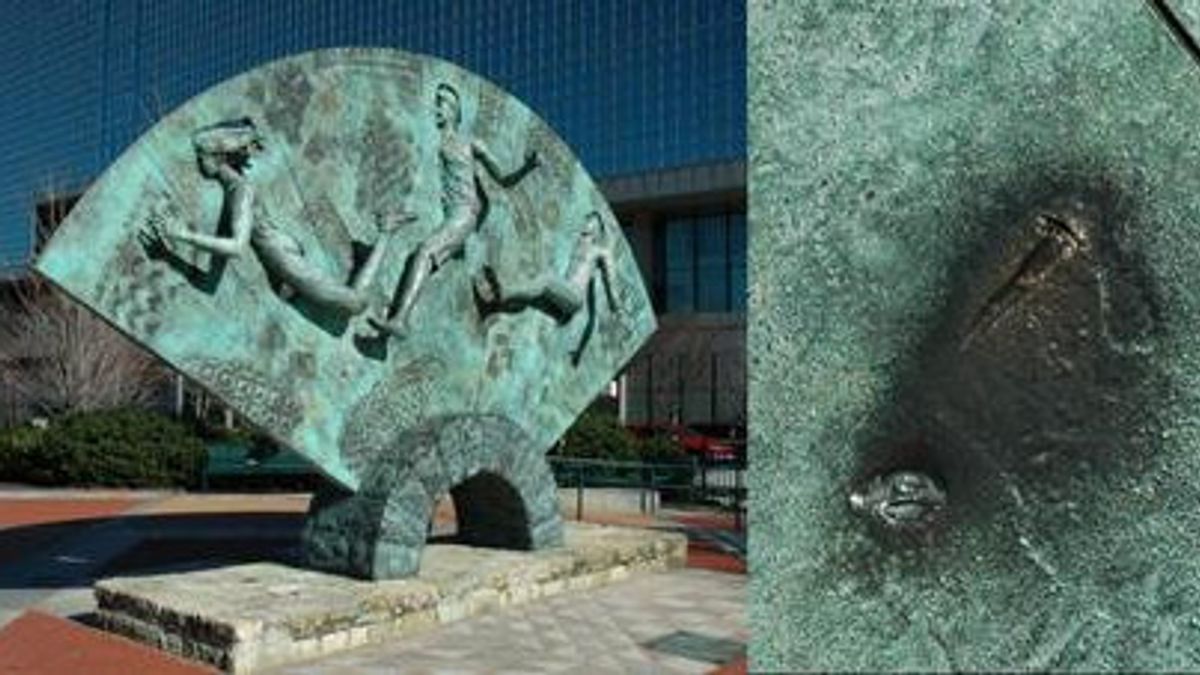JAKARTA - On July 27, 1996, an anonymous 911 call warned that a bomb was about to explode at the Centennial Olympic Park in Atlanta, United States (US). That's where the 1996 Olympics were taking place.
The caller said, "There's a bomb in Centennial Park. You have 30 minutes." The call was later confirmed to have been made from a payphone near the area.
About 22 minutes later, a 40 pound or about 18 kilogram pipe bomb exploded. The bombing killed a mother carrying her daughter and injured more than a hundred others, including a Turkish cameraman who had a heart attack in the explosion.
Within days a security guard named Richard Jewell was investigated for the crime. Citing the Law Library-American Law and Legal Information, before the bomb exploded Richard Jewell helped lead the evacuation which limited the death toll.
'suspected hero'Jewell's heroism was widely praised. But within three days, the FBI suspected Jewell as a suspect.
The FBI suspected Jewell after conducting eleven interviews. The FBI theorizes Jewell planted the bomb to be seen as a hero.
The theory leaked to the press. The Atlanta Journal-Constitution published an additional issue on July 30 entitled Suspect 'Hero' May Plant the Bomb.

Explosion effect on statue at Centennial Olympic Park (Source: Wikimedia Commons)
The accusations against Jewell were heightened by reports that Jewell was seeking publicity for his heroism. On NBC's evening news program, host Tom Brokaw said the FBI 'probably' had enough evidence to arrest and prosecute Jewell.
The investigation lasted three months. During the investigation, Jewell was the target of two lawsuits by bombing survivors, who were later dismissed.
Jewell maintains his innocence. Jewell tried to clear his name by showing he doesn't approach the media to seek attention.
Legal status annulledOn October 26, 1996, the FBI determined Jewell was not a suspect in the bombings. Jewell appeared at a press conference, where he said he had spent 88 days living in fear.
Atlanta US attorney Kent Alexander sent a letter to Jewell saying "based on the evidence developed to date ... Richard Jewell is not considered a target of any federal criminal investigation for the July 27, 1996, bombing of Centennial Olympic Park in Atlanta."
The letter did not express an apology. But in a separate statement issued by Alexander, the US Department of Justice regretted the leak of the investigation.
A separately issued statement said Jewell "experienced highly unusual and intense publicity, which was neither designed nor intended by the FBI, and in fact interferes with the investigation."

The letter also said, "The public should bear in mind that Richard Jewell was never charged with any crime in connection with the bombing and property seized under a court-approved search warrant has been returned."
The New York Times reported that the statement was "highly unusual" because "it is an indirect admission by Federal officials that they were wrong in their suspicions of Jewell."
An apology for the FBI's fault in pinpointing the suspect was never actually delivered. Even at a press conference held in July 1997, when US Attorney General Janet Reno expressed her personal regret.
Again Reno was only sorry for the leak that caused high publicity to Jewell. He said, "I'm so sorry it happened. I think we owe him an apology. I regret the leak."
The real culpritThe real perpetrators who have not been caught are free to carry out bombings at various points. Citing History, on January 16, 1997, two bombs exploded at a medical clinic in Atlanta that performed abortions.
The bomb injured seven people. In February of the same year, a bomb exploded at a lesbian nightclub in Atlanta and injured four people.
On January 29, 1998, a bomb exploded at a women's health clinic in Birmingham, Alabama. The bomb killed a security guard and critically injured a nurse.
The series of bombings was carried out by the same perpetrator as the 1996 Atlanta Olympics bombing. He was Eric Rudolph.
Rudolph was first identified as a suspect in the Birmingham bombings after witnesses reported seeing his pickup truck near the clinic. Authorities then launched a massive manhunt in North Carolina, where Rudolph was seen stockpiling supplies.

In February 1998, Rudolph was formally charged as a suspect in the Birmingham bombings. In March 1998, Rudolph's brother, Daniel, cut off his hand.
He did this to protest what he saw as the mistreatment of Eric by the FBI and the media. In May of the same year, Rudolph was added to the FBI's Ten Most Wanted List.
A $1 million reward was offered for his arrest. In July, a North Carolina health food store owner reported Rudolph had taken six months of food and supplies from him, leaving $500 in exchange.
On May 31, 2003, after more than five years on the run, Rudolph was arrested by police officers who found him digging through the Dumpster grocery store in Murphy, North Carolina. On April 8, 2005, just weeks before his trial was scheduled to begin, the Department of Justice announced that Rudolph would soon plead guilty to charges against him in the four bombings.
Rudolph was later sentenced to four life sentences without parole. Rudolph was sent to the supermax federal prison in Florence, Colorado.
*Read other information about WORLD HISTORY or read other interesting articles from Putri Ainur Islam.
TODAY'S HISTORY MoreThe English, Chinese, Japanese, Arabic, and French versions are automatically generated by the AI. So there may still be inaccuracies in translating, please always see Indonesian as our main language. (system supported by DigitalSiber.id)












